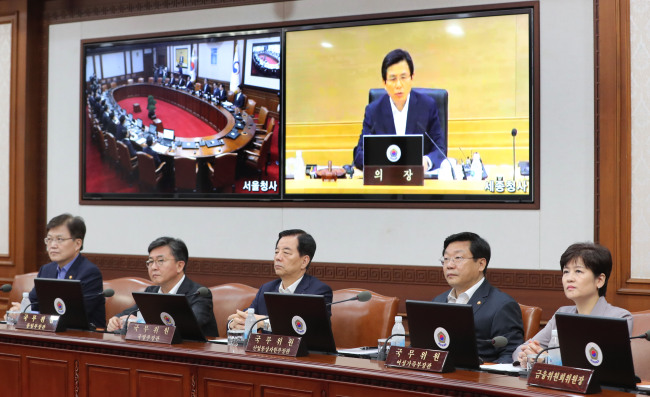The controversial visit by six first-termers of The Minjoo Party of Korea to China was met with little fanfare since their arrival on Monday, as the Seoul government continued to slam the trip and reaffirmed the need to station the U.S.’ Terminal High Altitude Area Defense system here.
“We’re at a critical moment when it’s more important than anything to gather strength from all people in unison to surmount this grave security situation, instead of incurring internal division and confrontation through social controversy,” Prime Minister Hwang Kyo-ahn said at a cabinet meeting on Tuesday.
President Park Geun-hye later echoed Hwang’s views during her speech at the ruling Saenuri Party’s convention to elect a new leadership.
“The disputed THAAD installment is a minimal defense measure to safeguard the survival of the nation and of the people, as well as an inevitable one to counter North Korea’s nuclear and missile threats,” she said.
As the six lawmakers pressed ahead with the trip, despite criticism from the government and some fellow party members, they ran into a series of snags for scheduled meetings with Seoul’s Ambassador Kim Jang-soo and Korean businesspeople in Beijing.
 |
Cabinet members, including Defense Minister Han Min-koo (third from left), listen as Prime Minister Hwang Kyo-ahn (on screen) comments on the Terminal High Altitude Area Defense deployment controversy during a Cabinet meeting held via video between Seoul and Sejong on Tuesday. (Yonhap) |
During a session with scholars at Peking University, the lawmakers were reported to have sought to deliver Seoul’s intentions behind the THAAD decision and the gravity of North Korean threats. But their attempt was reportedly eclipsed by the Chinese side’s sour reaction including warnings of economic retaliation or other forms of repercussion.
The lawmakers were also scheduled to meet South Korean Ambassador to China Kim Jang-soo, but the plan was canceled.
The Foreign Ministry here later explained that the cancelation of the meeting was a decision by the lawmakers citing scheduling differences.
Instead of meeting the visiting lawmakers, Kim met with China’s special representative for the Korean Peninsula, Wu Dawei, to explain Seoul’s position on the THAAD deployment, according to sources. It was the first official diplomatic delivery of Seoul’s position to Beijing.
Meanwhile, the Minjoo and minor opposition People’s Party took issue with the president accusing on Monday some politicians of being in line with North Korea’s views which argued the THAAD installment essentially made way for its additional provocations.
“What kind of president is she by labeling opposition lawmakers as traitors and pro-North Korea forces?” Minjoo floor leader Rep. Woo Sang-ho said Tuesday, calling for her apology.
“Why did she remain silent when Saenuri lawmakers and local government heads visited China (last month)? Was it unpatriotic, toadyish and pro-North?”
People’s Party floor leader Rep. Park Jie-won also lashed out at Park for taking advantage of the THAAD issue for her domestic interests.
“It is ultimately only for the president’s domestic politics to demand the people choose between patriotic and unpatriotic, security and North Korea, and China and the U.S. by taking the driver’s seat in criticizing China, especially at a time when she does not care to convince either the residents of Seongju County (the planned THAAD site) or the people of the Republic of Korea,” he said at a meeting of party lawmakers.
By Shin Hyon-hee (
heeshin@heraldcorp.com)








